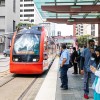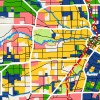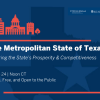
A statewide public transportation plan proposes better bus connectivity and new high-speed rail for Houston.

A statewide public transportation plan proposes better bus connectivity and new high-speed rail for Houston.

‘Just stuck out here’: Bus riders simmer under sun in Houston’s hottest neighborhoods
Harris County residents routinely wait for buses under the scorching sun with no shelter, a burden that impacts health and habits, according to Kinder Institute research.

Third Ward EV shuttle offers a way to close the first-and-last-mile gap in transit
Third Ward residents have recently gained increased access to grocery stores, health care, public transit and other necessities, thanks to an electric vehicle shuttle service that transports residents at no cost. It is part of a 12-week pilot program that could help close a critical transportation gap in Houston communities facing transit disadvantages and low vehicle ownership.

Houston is a city for cars today, but that doesn’t mean it has to be one in the future. In a new book, “Inclusive Transportation: A Manifesto for Repairing Divided Communities”, Veronica O. Davis makes the case that reorienting communities toward people rather than automobiles is in the hands of everyday people as well as policymakers.

Highways, flooding and sprawl: How Houston could have a bigger say in the region's future
Back in 2021, the Houston region's governing council offered up a final resolution of support for the contentious I-45 expansion project. The measure passed 14-11, with suburban members narrowly outvoting those representing Houston and Harris County. The vote marked an episode of stark division and intense scrutiny for the Houston-Galveston Area Council (H-GAC). It also raised questions about regional governance and how the Houston area’s urban and suburban populations should be represented.

Houston’s moment for transit-oriented development may have finally arrived
This week, the Board of Directors of the Metropolitan Transit Authority of Harris County is expected to vote on an update to the agency’s development policies—a key step as the agency fundamentally rethinks how it can influence the urban fabric of Houston so that more people can live in proximity to public transit.

Metro seeks to bring inclusive, transit-oriented development to north Houston
After receiving a new federal grant to explore the potential for transit-oriented development at the Tidwell Transit Center in north Houston, Metro is now phasing into an “intense and aggressive public involvement strategy” for the site.

To achieve Vision Zero, Houston must shift the way it thinks about transportation at every level
Vision Zero has been changing traffic safety culture internationally since the 1990s, but in Houston, it did not begin until the 2010s. A traffic safety culture shift is happening among city leaders and within departments. However, transforming communitywide beliefs here will require meaningful engagement, clear strategies and sustained political will for the long road ahead.

Kinder Institute Forum: Tamika L. Butler
A national expert and speaker on issues related to the built environment and equity, Tamika L. Butler discusses institutional oppression, the importance of inclusive urban design, and how to make transportation and public spaces more equitable.

Journalist Angie Schmitt discusses her new book, "Right of Way: Race, Class, and the Silent Epidemic of Pedestrian Deaths in America."

Webinar: Linking Quality Transportation and Affordable Housing
This webinar by LINK Houston and the Kinder Institute for Urban Research explores the nexus between transit and housing.

The Urban Sun Belt: Setting The Agenda
This webinar explores findings from a report from the Kinder Institute on the urban Sun Belt – covering such topics as demographic change, the economy, housing, and sprawl. A panel discussion follows the presentation

The Metropolitan State of Texas: Securing the State's Prosperity and Competitiveness
The LBJ Urban Lab at The University of Texas at Austin, the Kinder Institute for Urban Research at Rice University and the George W. Bush Institute-SMU Economic Growth Initiative convened the state's top urban policy researchers for a summit addressing the most important issues in Texas cities: economic development, land use, housing, infrastructure and transportation.

Houston on the Front Lines of Sprawl
In this talk, William Fulton discusses Houston as a prototypical, sprawling Sun Belt city.

Technology historian Peter Norton discusses his book, "Autonorama: The Illusory Promise of High-Tech Driving."
Rice University
Kraft Hall
6100 Main Street, Suite 305
Houston, TX 77005-1892